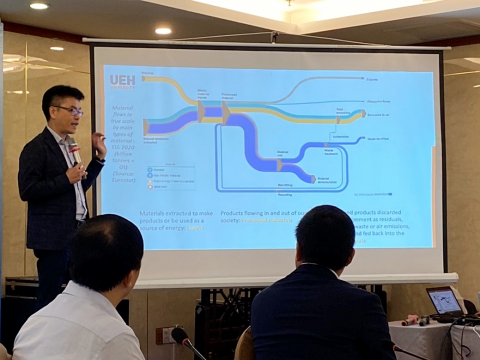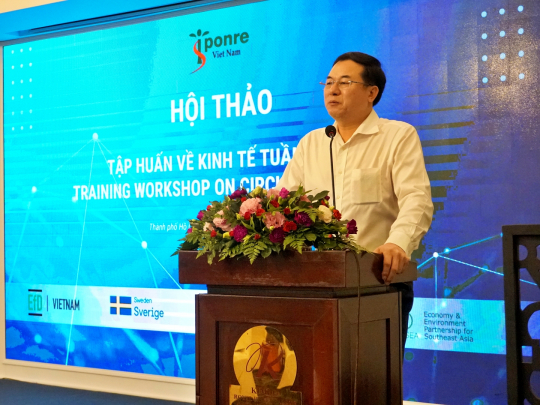
EfD researchers contribute to Vietnam's circular economy plan
EfD Vietnam has made several contributions to the country’s National Action Plan for Circular Economy which was presented to the Prime Minister in December 2023, to be implemented in 2024.
Vietnam has currently a very low rate of recycling, reusing, redesigning, etc. For one thing, the country needs to develop infrastructure and technology for a circular economy. In addition, the financial incentives to contribute to a circular economy are poor. For instance, glass manufacturers who need glass scraps as raw material find it less expensive to buy imported glass scraps than to recycle domestic material. One significant challenge is also the lack of data that is needed to guide actions and policies.
The Vietnamese government is creating a National Action Plan for Circular Economy (NAPCE) to take a concerted approach. The first draft of the NAPCE was produced in June 2023 in a consultation workshop organized by the Institute of Strategy and Policy on Natural Resources and Environment (ISPONRE) in Vietnam. The workshop was attended by representatives from ministries, provincial people’s committees, development partners, UN agencies, NGOs, businesses, research institutes, media, and other experts.
EfD Vietnam’s Director, Pham Khanh Nam participated and shared the center’s insights
on material flows in a circular economy and the scientific basis for proposing priority sectors in the NAPCE. He shared, among others, insights into the circularity rate and material flow in Vietnam and how they are distributed across different economic
sectors. He also pointed out the challenges of data availability.
Better data and management is needed
Pham Khanh Nam suggested that improving data collection and management systems is essential for developing and implementing effective policies and strategies for circular economy in Vietnam. He also recommended that priority sectors for NAPCE should be based on criteria such as material intensity, environmental impact, economic value, and social benefit.
“We will incorporate the comments and suggestions from the workshop into the final draft of NAPCE before submitting it to the ministry and the Prime Minister for approval,” commented Mai Thanh Dung, the Deputy Director of The Institute of Strategy and Policy on Natural Resources and Environment (ISPONRE) at the workshop.
In September 2023, Pham Khanh Nam attended a “writeshop” held by ISPONRE to finalize the NAPCE.
“My input at the seminar, such as measurements of circular economy, have been implemented in the plan,” noted Pham Khanh Nam.
Government and industries most affected
The final version was submitted to the Prime Minister in December 2023. While waiting for the Prime Minister’s approval, EfD Vietnam and ISPONRE co-organized a training workshop for government officials in the southern region of Vietnam to train government officials in implementing the upcoming NAPCE.
The plan will mainly affect two key players: government bodies at the provincial level that will have to fulfill their circular economy goals and private actors, mainly in manufacturing, that need to reduce waste and increase the efficiency in using inputs. The NAPCE will be implemented during the first part of 2024.
“Winners will be society as a whole when the resources are used efficiently, and waste is reduced. Losers could be industries or regions that lose their competitiveness if they have costs related to the circular economy while their competitors do not. In some cases, subsidies may be needed,” notes Pham Khanh Nam.




